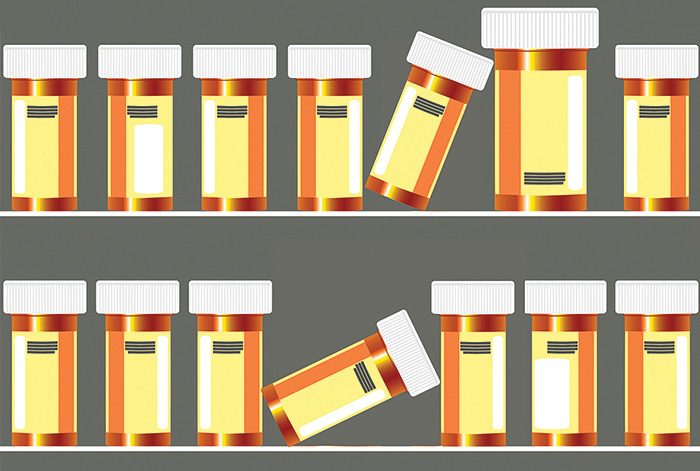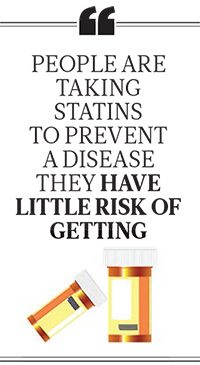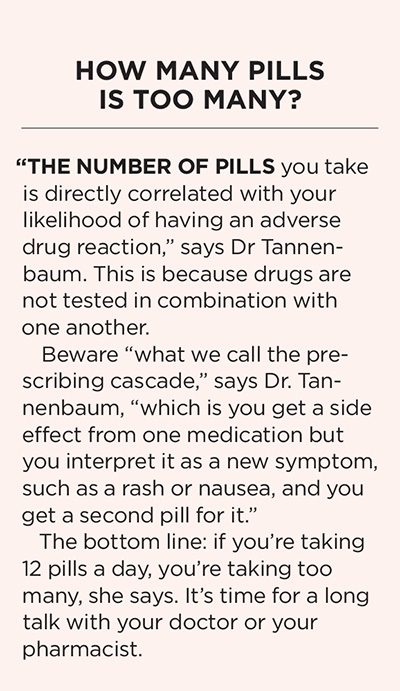When Medicines Do More Harm Than Good
If you’re older, you are at risk from the major problem of over-prescribing

One Friday morning, as freelance photographer and writer Jan Malý, 61, of Prague, Czech Republic, sat at his computer, his eyesight began to blur, and then: “All of sudden, I felt like swooning,” he says. The next day, at almost the same time, it happened again.
Just six weeks before, routine tests revealed that his usually normal blood pressure had risen to 150 over 90 (140 over 90 is considered high). Although these numbers can fluctuate, Jan’s doctor relied on just one reading before prescribing a daily 50 mg dose of the blood pressure medicine, Losartan.
The morning after the second episode, as Jan prepared to cook breakfast, he collapsed.
Tests determined that his blood pressure was well below normal: 80 over 40. Further investigation revealed it was dropping to these potentially dangerous levels each day about an hour after he took his Losartan.
Jan Malý had joined a very large group of older people whose medicines were doing them more harm than good.
As you get older, your medicine cabinet can begin to resemble a pharmacy.
But today, many researchers are asking: do you—or do many people 55 and older—really need quite so many medications?
Dr Cara Tannenbaum, geriatrician and pharmacy professor at the University of Montreal and director of the Canadian Deprescribing Network, says that over-prescribing for older people is a major problem. “With age, your kidney and liver, which help eliminate wastes from your body, are likely to be less efficient,” she says. So the dose you were taking ten years ago might be too high for you today.
Or the medication might not be right for you at all.
Too often, physicians either don’t follow up to ensure that prescriptions are well-tolerated, or continue to refill old prescriptions without considering whether those drugs are still—or were ever—necessary.
In consultation with his doctor and a dietitian Jan Malý changed what he ate, began to exercise more and lost 18 kilograms. His blood pressure now stays in a healthy range of about 130 over 80, with no medication.
As Jan learned, some of the most common medicines prescribed can also be among the most problematic.
Blood pressure medication
Lowering blood pressure does reduce deaths from heart disease, says a recent large US study. But people are often prescribed high doses of medication even after pressure reaches optimum levels. And over-treatment, especially in older people, can lead to dizzy spells, confusion, falls, even severe kidney problems.
One group is particularly at risk of adverse effects: people with diabetes. Dr Mattias Brunström of Umea University, Sweden, analyzed cases in the national database of people with diabetes who were taking blood pressure medication. Not all of them actually had high blood pressure. In such patients, Dr Brunström found that taking blood pressure lowering medications actually increased the risks of death from heart disease and stroke by 15 per cent. “The ability to deal with drops in blood pressure seems to be impaired in people with diabetes,” he explains.
Statins to lower Cholesterol
Alain Morise, now 74, of Sylvains les Moulins, France, had always been in excellent shape with cholesterol in the normal range. But because he smoked, and smoking can increase the risk of heart disease, his doctor prescribed a cholesterol-lowering drug called a statin. One day in September 2013, after taking the statin for about 10 years, Alain’s muscles froze while he tried to walk through his doorway.
The use of statins has increased so dramatically in Europe that as many as 13 percent of the adult population in the UK and Slovak Republic are on the drugs, according to a 2013 OECD report.
 But many are taking statins for prevention of a disease they have a vanishingly small risk of getting. Statins are a years-long strategy to reduce the build-up of cholesterol-laden plaque in your blood vessels. If you have no current signs of build-up, and you’re older, statins might give you little to none of this long-term preventive benefit. In the US, statins are recommended for middle-aged and older people with as little as a seven-and-a-half percent risk of developing it.
But many are taking statins for prevention of a disease they have a vanishingly small risk of getting. Statins are a years-long strategy to reduce the build-up of cholesterol-laden plaque in your blood vessels. If you have no current signs of build-up, and you’re older, statins might give you little to none of this long-term preventive benefit. In the US, statins are recommended for middle-aged and older people with as little as a seven-and-a-half percent risk of developing it.
According to Dr Ronald Krauss of Children’s Hospital, Oakland Research Centre, in California, if you’re otherwise healthy and just taking a statin because you’re worried about your cholesterol, “You may have a greater chance of developing diabetes or muscle problems than you do of getting benefit for heart disease risk.”
After Alain Morise’s muscles froze, making it impossible to walk, he was rushed to hospital where a rheumatologist immediately suspected his medication was causing his symptoms. Biopsies confirmed it. Statins had recently been implicated in auto-immune muscle disorders such as necrotizing polymyositis, the devastating condition that afflicted Alain and that dramatically weakens muscles.
Alain lost 30 kilograms. “You could see his bones,” says his wife, Marie-France. He spent many months in and out of hospital. Doctors prescribed cortisone, a steroid that dampens the overactive immune system’s response, and after 18 months on the drug Alain was able to walk again, but only for short distances.
Though necrotizing polymyositis is relatively rare, statins have also been implicated in other muscle ailments causing symptoms from intense pain to damage to the heart muscle.
And increased risks of new-onset diabetes due to statin may be as high as 48 percent in women aged 50 to 79, according to a major 2012 study. Professor Eliano Pio Navarese of the Cochrane Heart Group, London, who authored a meta-analysis (combining results from multiple studies) on statins’ effects in 2013, says the risk is greatest in those who are obese or pre-diabetic.
For those with high cholesterol who can’t take statins, a newer of drugs called PCSK9 inhibitors can dramatically lower levels but don’t appear to cause the same problems, says Professor Navarese.
Insulin for diabetes
Those with Type 1 diabetes and many with later stage Type 2 rely upon insulin to keep their blood sugar under control. It can be essential for anyone who has had an A1C level (a measure of glucose in the bloodstream) at nine or above for an extended period.
But “the benefits of treating diabetes well actually happen over the course of decades,” says Dr Sussman. So if you have fewer decades ahead, you’re less likely to gain the long-term preventive benefits of aggressive treatment, while still facing over-treatment’s significant risks.
When people take more insulin than necessary, they can develop hypoglycemia—meaning that they have too little glucose (sugar) circulating in their bloodstreams. This can lead to confusion and other cognitive impairments, falls, coma and even death.
“It happens often enough so that we think people are being put at risk who don’t need to be,” says Dr Sussman.
And yet in his 2015 study Dr Sussman found that older patients with diabetes rarely had their insulin dosages adjusted, even when their blood sugar levels were low enough to put them in the danger zone.
What counts as dangerously low? An A1C under six is risky, he says. The safe zone in his study was between 6.5 and 7.5.
“As people get older, a small amount off can become more dangerous,” says Dr Sussman. A too-low A1C from over-treatment is an immediate danger.
Proton Pump Inhibitors for indigestion and acid reflux
Carin Aarts, 56, of St Michielsgestel, Netherlands, had been taking the proton pump inhibitor (PPI) omeprazole for many years for her indigestion. She’d also recently begun suffering headaches and high blood pressure, but no-one had connected those symptoms to omeprazole. It wasn’t until 2014 that a visit to her doctor revealed that the PPI had caused such a severe magnesium deficiency, it put her heart in immediate danger.
PPIs are often recommended for the prevention of ulcers, gastro-intestinal bleeding, and to reduce acid reflux due to excess stomach acid—which they block so effectively that their popularity has exploded worldwide, with sales worth an estimated $127 million in Europe in 2013.
But they’re too effective to be used so freely. Stomach acid is necessary to break down vitamins and minerals so the body can utilize them. After years of taking PPIs, people can develop severe deficiencies. Dr Jeroen de Baaij of Radboud University Medical Centre in the Netherlands found that “about ten to 15 per cent [taking PPIs] had a shortage of magnesium in the blood.”
PPIs are particularly risky for people aged 65 and older. Long-term deficiencies can leave the bones weak. And a 2016 German study links PPI use with an increased risk of dementia in the elderly, apparently due to PPIs blocking vitamin B 12 absorption.
Worse, the body compensates for the loss of acid by increasing the number of acid-producing cells. So when people try to stop taking PPIs after long-term use, they often suffer greater indigestion than when they first took them.
“If I prescribe you a new pill,” says Dr Tannenbaum. “I’m going to say, let’s reassess in three months’. Assume that’s the stop date unless there’s reason to continue it.”
The issue of a “stop date” had never come up for Carin Aarts. Admitted to hospital with heart arrhythmia, she was given intravenous magnesium in the coronary care unit. Doctors immediately suspected her omeprazole was the cause. But when they tried to take her off the drug, she suffered greater digestive pain and distress than ever.
 Carin can no longer function without omeprazole but she’ll also have to supplement magnesium from now on, which brings its own risks: magnesium can act as a laxative, leading to severe diarrhea.
Carin can no longer function without omeprazole but she’ll also have to supplement magnesium from now on, which brings its own risks: magnesium can act as a laxative, leading to severe diarrhea.
A safer bet for people who suffer from occasional indigestion or acid reflux is to remove the foods which seem to trigger distress (commonly caffeine, alcohol, and fatty or fried and spicy foods) from your diet. When an antacid is necessary, try a short course of a histamine-2 blocker such as famotidine (Pepcid), ranitidine (Zantac), or cimetidine (Tagamet).
If you’ve been on a PPI for a while, get in touch with your doctor about weaning off.
Sedatives for Insomnia
Some of the more recent anti-insomnia drugs, including zolpidem (Ambien/Stilnox), can cause cognitive problems including amnesia. In February 2008 the Australian Therapeutic Goods Administration attached a boxed warning to Zolpidem, stating that it “may be associated with potentially dangerous complex sleep-related behaviors that may include sleep walking, sleep driving…” Other sedatives in this family, such as eszopiclone (Lunesta) and zaleplon (Sonata) have been reported to cause the same types of symptoms.
The drugs tend to have a greater effect on women and the elderly age 80 and over who are, for example, more likely to be involved in car collisions in the days after taking zolpidem at night. They are also linked to increases in falls. And,these drugs can actually make insomnia worse once you try to stop taking them, even after as little as a week’s use.
And a Taiwanese study published in 2015 found that Zolpidem and similar drugs appeared to increase the risk of dementia in the elderly.
The best alternative might not be another pill, says Dr Tannenbaum, but cognitive behavioral therapy. A 2012 meta-analysis of earlier studies found this therapy superior to any of the insomnia drugs typically prescribed.
“[Doctors] need to really consider the person’s risk in relation to the medication,” says Dr Tannenbaum. “And that needs to be assessed regularly.”
She suggests a reassessment of all the medications you take at least once a year, and within three months after you begin a new medicine.
While you should never stop taking a medication or change your dosage without medical guidance, always insist on discussing the risks versus the benefits of every medicine with your doctor and pharmacist. And ask whether your prescriptions continue to be right for you as you grow older.
Stay informed to ensure your prescription drugs aren’t doing you more harm than good.
Don’t Mix These
Statins
+ foods/supplements: grapefruit juice, niacin
+ drugs: digoxin, anti-coagulants, colchicine
Insulin
+ foods/supplements: alcohol (or consume minimally); aloe, chromium, fenugreek, ginseng, gymnema, coenzyme Q10, vanadium
+ drugs: blood pressure medications, Tequin
Proton Pump Inhibitors
+ drugs: tacrolimus, clopidogrel, anti-retrovirals atazanavir, nelfinavir, saquinavir, digoxin
Sedatives
+ foods/supplements: alcohol
+ drugs: anti-depressants such as Zoloft and Prozac, ketoconazole, benzodiazepines such as diazepam, alprazolam, lorazepam, clonazepam
Blood pressure Medication
+ foods/supplements: licorice, potassium, arginine, St John’s wort, dong Quai
+ drugs: Lithium, Insulin, oral anticoagulants, NSAIDs



